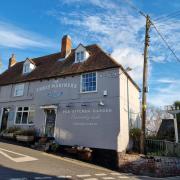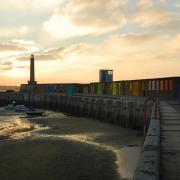A labyrinth of tunnels reaching deep under the White Cliffs of Dover, forgotten since the Second World War, is now open to visitors, thanks to a public appeal and a two-year conservation project by the National Trust
The complex network of tunnels that is Fan Bay Deep Shelter, along with a now-lost gun battery above ground, was built on the orders of Sir Winston Churchill, who personally came and inspected them in 1941.
They formed part of Dover’s connected offensive and defensive gun batteries, designed to prevent German shipping moving freely in the English Channel. Carved out of the chalk underneath this iconic landmark, the shelter would have accommodated four officers and up to 185 men of other ranks, providing bomb-proof accommodation, a hospital and secure store.
After the war, the site was decommissioned, eventually abandoned and filled in during the 1970s. Fan Bay Deep Shelter lay forgotten until 2012 when the land was purchased by the Trust and a hole in it was then discovered.
Jon Barker, Experience Manager at the White Cliffs of Dover, takes up the story: “We learned of the existence of Fan Bay Deep Shelter after discovering and exploring a hole in the ground in this newly purchased stretch of the White Cliffs.
“The excavation project took us nearly two years to complete, involving an enormous team of more than 50 volunteers, plus archaeologists, mine consultants, engineers and geologists.
“We shifted more than 100 tonnes of soil and rubble by hand to literally uncover their secrets. Once we got inside the tunnels, we had to carry out a fair bit of conservation work, since no one had been there in 40 years.
“We unearthed all kinds of poignant reminders of the men who lived and worked here during the war, plus two huge historic sound mirrors, the precursors to radar technology. Now that the tunnels have been re-opened, we hope the public will be as intrigued as we were to explore this hidden part of Dover’s wartime history.”
The tunnels have opened to the public in the same year that the National Trust celebrates 50 years of Project Neptune, a fundraising campaign designed to save the Great British coastline. In 2012, it was this fundraising campaign that helped raise £1.2million in just 133 days to acquire the land that Fan Bay Deep Shelter is on.
Inside history
Fan Bay Deep Shelter is the largest of its kind in Dover and one of the deepest recovered from the Second World War, sitting 23m below the surface. Once inside, visitors will descend the original 125 steps and be guided through more than 3,500 square feet of tunnels, reinforced with heavy duty iron girders and metal sheeting.
The hard hat and torch-lit tours will reveal the story of the tunnels’ creation, use and final abandonment. Vast amounts of wartime graffiti, comprising thousands of carvings, inscriptions and ditties in pencil and chalk, line the walls, acting as a roll-call of the men who excavated the shelter or were stationed at this front line.
The enormous First World War concrete sound mirrors, perched on the edge of the cliffs, are a feat of engineering that helped give advanced warning of approaching enemy aircraft.
As Jon says: “The whole area is a reminder of the human story behind Dover’s crucial role during the First and Second World Wars. The White Cliffs are forever linked to our country’s defences and the tunnels, with their graffiti-covered walls, are an emotive time capsule.”
Find out more
Tours of the tunnels must be pre-booked via www.nationaltrust.org.uk/white-cliffs-dover. Participants must be over 12 years old and in good health. There is no vehicular access to Fan Bay Deep Shelter, and the experience starts off with a 45-minute walk to the entrance.
Tickets cost £10 per adult and £5 for 12 to 18 year olds, or are free to National Trust members.
The National Trust is asking for help identifying the men who built or were stationed at Fan Bay Deep Shelter from the 172nd Tunnelling Company, 203rd Coast Battery or 540th Coast Regiment, Royal Artillery.
If you have any information, please contact the White Cliffs via whitecliffs@nationaltrust.org.uk or 01304 202756.
w



























